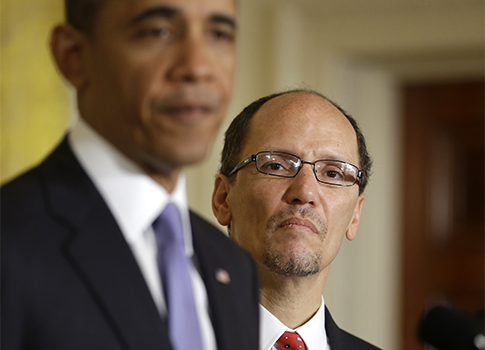Maryland political observers say President Barack Obama’s labor secretary nominee Thomas Perez will tilt the balance of labor relations to organized labor’s favor.
Christopher B. Summers, president of the nonpartisan Maryland Public Policy Institute, said Perez’s tenure as the head of Maryland’s labor department was a boon for organized labor.
"He saw his role [as Maryland labor secretary] as expanding unions," he said. "He’ll try to Marylandize the rest of the country."
Maryland union officials welcomed the news that Obama had tapped Perez to succeed outgoing Labor Secretary Hilda Solis.
Fred Mason, president of the AFL-CIO in Maryland and Washington, D.C, said Perez possessed the "sense of fairness" that would make him a good fit for the Obama cabinet.
"He had a certain consciousness about the plight of labor in this economy. He wanted to create a more level playing field," he said. "Unions helped build this country and Tom Perez recognizes that; he was good for Maryland and will be great for America."
Perez pushed for stringent wage laws in the state, including the push to make Maryland the first "living wage state." He helped to pass a law that forced government contractors to pay employees $11.30 per hour—a policy that has steered more projects to union workers, while increasing project costs for the state.
"Governments should use [its] purchasing power to lift up workers and set an example for employers," Perez said at the time. "Living wage and prevailing wage laws do just that."
Such policies have won him major supporters in the union landscape, but many economists say that driving up the costs of hiring workers hurts workers by increasing unemployment.
"[Perez] thinks that it is the government’s responsibility to raise wages and create prosperity, but what it really does is create more barriers for employers," said Mike Saltsman, research fellow of the Employment Policies Institute.
Perez wrote numerous op-eds and made several public appearances to push through living wage laws and ramped up enforcement of prevailing wage laws, according to Mason.
The union leader said experience makes him a natural advocate for Obama’s push to raise the national minimum wage to $9 per hour, a 24 percent increase.
"Maryland contractors have significantly higher wages than the $7.25 [federal] minimum wage; he did what he could to lead that fight to make sure that contracts carry that prevailing wage, that living wage," Mason said. "He’s not against a business making a profit, but he cares for people who happen to be workers."
Summers said Perez’s policies are more about serving union interests than they are the common worker. Prevailing wage laws and minimum wage increases will boost union salaries at a higher rate than average workers—more than 98 percent of whom earn more than the minimum wage.
"These are no-holds-barred methods of increasing the reach of the labor establishment," Summers said.
Obama contended that Perez would serve as a "consensus builder" in introducing his nominee to the nation on Monday morning. However, Saltsman said the nominee’s track record in Maryland could spell trouble for businesses during already uncertain times.
"Perez’s rhetoric is not the rhetoric of a consensus builder; it is the rhetoric of an ideologically driven person that is trying to leverage government power to drive up the costs of doing business," he said. "This is not the time for more wage mandates, but he’s entirely in the tank of labor groups and will act on it."
